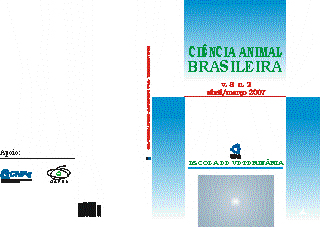MANNAN OLIGOSACCHARIDES AND ENZYMES IN CORN AND SOYBEAN MEAL BASED-DIETS FOR BROILERS
DOI:
https://doi.org/10.5216/cab.v8i3.1673Keywords:
Alimentos, enzimasAbstract
Mannan oligosaccharides, as an alternative to an-tibiotics, show promising results related to bird perfor-mance, immunity stimulus and improvement of intestinal mucosa. Enzyme inclusion in diets containing mannan oli-gosaccharides could improve these results. Poultry diets consist of corn and soybean meal, and approximately 30% of the phosphorus (P) in these ingredients is bound to phytic acid. Phytase is capable of release not only the P but also other nutrients that can be better used by the birds while corn is relatively free of viscosous nonstarch poly-saccharides (NSP), soybean has about 20% of NSP, whose digestibility is almost null. NSP`s insoluble component of corn and soybean encapsulate nutrients and are responsive to exogenous enzymes. Negative environmental and nutri-tional consequences of dietary phytic acid are reduced by phytase inclusion in monogastric diets. Additionally, the enzymatic complex supplementation improves the nutri-tional value of feedstuffs through higher digestibility in birds. Finally, the use of exogenous enzymes allows re-duction in feed costs.
KEY-WORDS: Animal nutrition, enzymatic supplementation, prebiotic.
Downloads
Downloads
Published
How to Cite
Issue
Section
License
Authors who publish with this journal agree to the following terms:
- Authors retain copyright and grant the journal right of first publication with the work simultaneously licensed under a Creative Commons Attribution License that allows others to share the work with an acknowledgement of the work's authorship and initial publication in this journal.
- Authors are able to enter into separate, additional contractual arrangements for the non-exclusive distribution of the journal's published version of the work (e.g., post it to an institutional repository or publish it in a book), with an acknowledgement of its initial publication in this journal.
- Authors are permitted and encouraged to post their work online (e.g. in institutional repositories or on their website) prior to and during the submission process, as it can lead to productive exchanges, as well as earlier and greater citation of published work (See The Effect of Open Access).




























